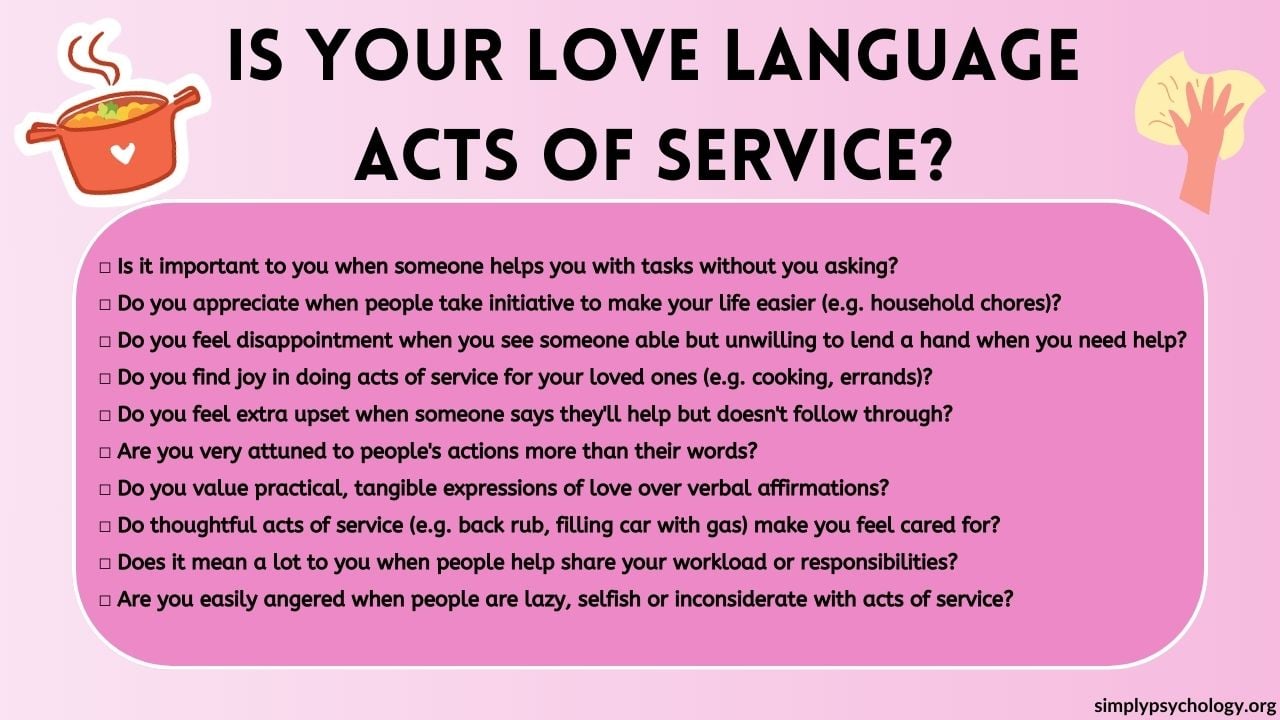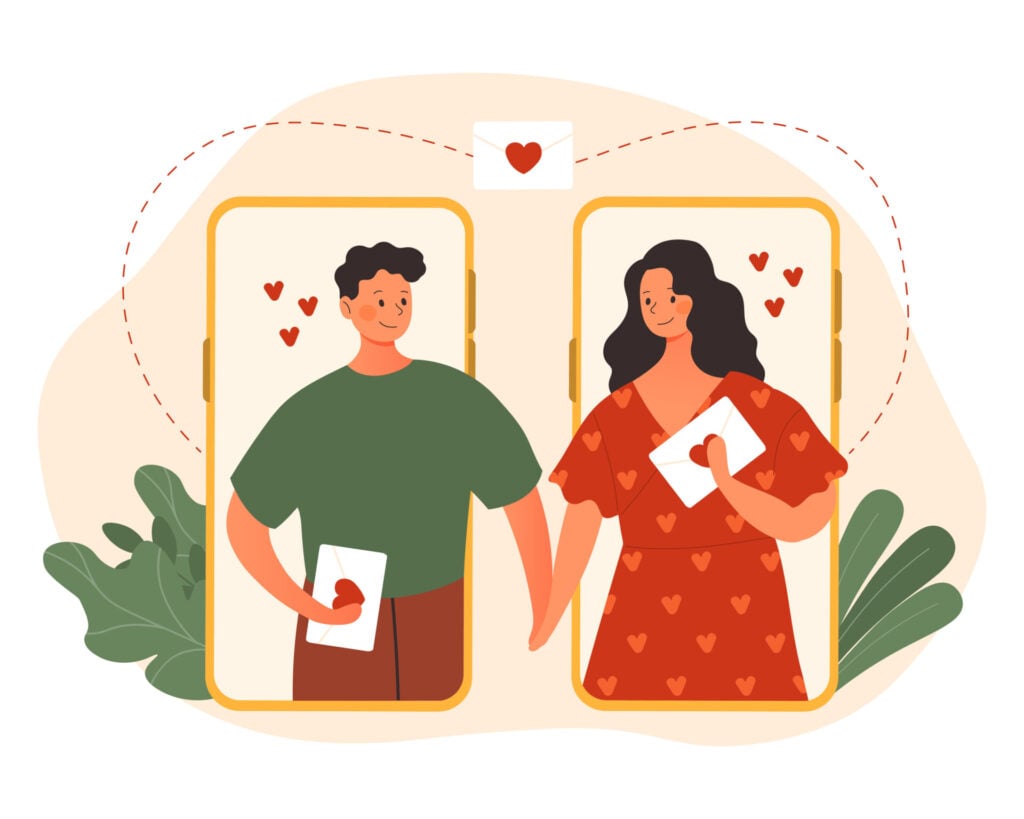Acts of service are one of Dr. Gary Chapman’s five love languages that focus on someone’s expression and receipt of love by helping with tasks or chores For those who prioritize this language, actions speak louder than words, with thoughtful deeds signifying care and appreciation.

What are acts of service as a love language?
Acts of service love language specifically refer to people who either feel loved or express love the best by doing tasks their partner would appreciate (Chapman & Chapman, (2010).
Such tasks one can do for their partner can range from washing the dishes and cleaning the house to filling their car with gas or getting their favorite take-out.
By displaying this initiative and doing tangible things to support them, they showcase their love in an “actions speak louder than words” manner.
Similarly, for people with this love language, it can be extra hurtful when people see them being overwhelmed and do not assist or if they offer to help but then fall through on that commitment.
Acts of service are not gender- or age-specific (Chapman & Campbell, 2008); anyone can have a preference or disinclination for them, which can also change over time as they are not rigid concepts.
“Acts of service is also keeping commitments. If you say, “I am going to do (xyz)” then do it. It shows them that they are worth the follow-through in keeping the commitment. It shows that they are worth the time.”
‘Zacheriah’
How do you know if your love language is acts of service?
One of the easiest ways to determine your primary love language is by taking the free quiz developed by Dr. Chapman himself (available on the Five Love Language website).
It will ask you a series of questions to help you reflect on your preferences and what is most meaningful to you.
Additionally, there are a few things you can reflect on yourself to help you decide if acts of service are your love language. You could ask yourself the following questions:
- Is it important to you when someone takes the initiative to help you?
- Do you feel particularly nice when people assist you or when someone offers to help without you explicitly asking them?
- Do you feel especially disappointed or that something is missing if someone does not show their appreciation/love for you this way?
If your love language is acts of service, that means that you feel loved and cared for when people perform a thoughtful act for you.
Similarly, you may tend to feel more upset when people make no attempts to assist you or do not offer to offload any of your tasks.
Having help around the house, sharing responsibilities, or a kind gesture focused on helping you run through your checklist truly makes you feel appreciated.
Many people unconsciously use their preferred love language to showcase their emotions to someone, as that is how expressing care comes the most naturally to them. Hence, you may also be someone who enjoys doing acts of service for others.
For example, you may make your partner breakfast, help babysit for your friend, pick up your parents from the airport so it is easier for them, etc.
You find genuine enjoyment in helping your loved ones in ways that can make their life a bit easier.

How to show acts of service to your partner

There are several ways to show your partner love through acts of service.
Firstly, begin by focusing on tasks that can be easily incorporated into your routine. For example, if your partner works late shifts but you finish work in the afternoon, surprise them with a home-cooked meal ready for them to take to work.
Your acts of service do not have to be grand gestures, but even small everyday things such as this example can truly show your appreciation and love.
Another suggestion is to identify what chores your partner dislikes and perform those tasks yourself. For example, if your partner does not like folding laundry, you can do that for them instead.
“You’ve thought about me and my needs and tried to make my life easier. For this reason, the acts of service should ideally be tasks that are important to me. The fact that you choose to do acts that are important to me shows that you know me and are paying attention. This is especially the case where it’s a job I dislike doing. It just feels like a relief that someone has tried to ease your burden.”
‘Yasmine’
It is worth highlighting that if you notice any such opportunities to show your partner love, do not wait to be told to do something.
Sometimes people with this love language may hesitate to ask or even accept help when offered as they do not want to burden people.
Thus, by taking the initiative yourself and helping with things that will need doing regardless, e.g., laundry, dishes, cooking, etc., you directly show you have paid attention to your partner and their needs.
This identification and working together in partnership can also have beneficial outcomes in maintaining healthy and happy relationships (Harway, 2004).
“Acts of service are about you doing something for me that I was already going to do. Take one of those burdens, large or small, off of me. You see I’m busy and offer to help. That is love.”
‘Elorie’
Acts of service examples
For some examples of acts of service you can use to show your loved one, here are areas you can focus on:
- Cleaning the house
- Cooking meals
- Organizing your space
- Planning holidays or fun activities
- Picking them up from the airport or work
- Surprising them with a reservation or take out
- Buying groceries
- Taking your pet on a walk
- Helping with self-care, e.g., drawing a bath for them
- Taking care of them if they are ill
- Taking care of the kids so they have some time for themselves
- Giving them a massage
While these are just suggestions, it is important to cater your acts of service to the person. Preferences vary across people, so by focusing on what your partner will appreciate the most, you can ensure you are displaying your care in ways your partner will receive the best.
How to do acts of service in a long distance relationship

Acts of service may be one of the trickiest love languages to perform during long-distance relationships, as several acts you would typically help with are actions taken in closer proximity.
Nevertheless, you might be surprised to find out that there are still several ways to adjust and incorporate this love language into your long-distance relationships.
Take any cues from conversations that may hint at your partner neglecting, putting off, or generally being upset by something, and see if there is any act you can do to help.
For example, if they have been procrastinating on an assignment or report, offer to proofread or schedule an online study/work date. By actively listening, you can identify the ideal ways to help.
Moreover, feel free to have an open conversation with your pattern about ways you can best support them. Long-distance relationships heavily rely on open communication, and incorporating this love language is no different.
By discussing with them, you show not only reflection on the matter but also initiative taking to identify the best ways you can care for them.
This shared understanding can strengthen the overall long-distance relationship as well (Stafford, 2004).
Examples
For some ideas of acts of service you can use to show your love in a long-distance relationship, here are some examples to try out:
- If they need to set an alarm or be reminded of something, offer to call/text to wake them up or remind them.
- Surprise them by scheduling food delivery from their favorite restaurant. Likewise, if your partner does not have time or motivation to do grocery shopping, you could schedule a grocery delivery for them.
- Plan a virtual movie night. There are online platforms available that allow multiple people to watch the same content together in real time. You can both prepare snacks and enjoy spending time together, even at a distance.
- Create a music playlist. This can be with songs that remind you of them, a study playlist, new artists you think they might like, etc. You can cater it to your person’s tastes and occasion. This could be particularly useful if your partner has to take a long drive and would like songs to listen to.
- Send them a gift card for a self-care day. This could be for a facial, spa, massage, nail salon, etc.
Frequently asked questions
Which love language goes best with acts of service?
There are two love languages that go best with acts of service. The first is gift-giving. Several acts of service can incorporate gift giving, such as surprising them with their favorite take-out, snack, show ticket, or even getting them a gift you know they wanted.
The second is words of affirmation. When performing an act of service, e.g., running a bath, you can include words of affirmation like compliments and other positive expressions of your emotions.
For example, you can say phrases such as “You mean so much to me,” “I love taking care of you,” “It makes me happy to see you happy,” etc.
This can be especially complimentary if you and your person either share the same primary love language or have one of the aforementioned in your top two most important love languages.
You will both intuitively align on how you receive and show love making it easier to navigate the relationship.
What should you avoid if your partner’s love language is acts of service?
If your partner’s love language is acts of service, there are a few things you should avoid.
Firstly, not tailoring your act of service to your person’s needs. They might enjoy doing some activities, e.g., walking the dog, so prioritize acts they would find most helpful if they had assistance.
Secondly, giving acts of service stemming from negative emotions. Your gestures should be genuine and not from resentment of your person’s need for them, only helping “so they can stop nagging,” or from the guilt of not being attentive.
Lastly, you should not perform acts you feel uncomfortable doing. Using the walking the dog example, if you are afraid of dogs, do not push yourself outside your limits.
This can create resentment and further issues. Instead, identify alternative acts that your partner will still appreciate but are honoring you as well.
How can you show acts of service to a friend?
Acts of service can be applicable to platonic friendships as well. If distance permits, you can offer to pick them up from work, buy a snack or meal you know they enjoy, organize a staycation or small getaway, or offer to help with personal/household errands.
If you live further away from your friend, you can order coffee to be delivered to their home/office, remind them of deadlines when something important is coming up, schedule study or work days (you can even go to your local cafes individually with your laptops and work together with cameras on), and regularly check in with them to see if there is any way you can support.
Can I show acts of service to myself?
You can absolutely show acts of service to yourself. This can be a foreign concept as many are used to expressing love to others but seldom to just themselves.
Firstly, identify things that future you will appreciate you have done. This could range from buying a planner to get more organized, crossing things off your to-do list, and cleaning or decorating your space to make it more inviting and aesthetically pleasing.
Secondly, you can prioritize your own self-care. Some suggestions would be to treat yourself to a spa, facial, massage, or a nice meal. You do not have to wait for a special occasion to do so.
You can simply book one as a way to show yourself some love. Additionally, you can schedule ahead certain recurring appointments, such as haircuts or dentists.
Lastly, you can look for ways to simplify your life through automation. For example, instead of buying groceries at the store, schedule an online delivery, and instead of manually paying your bills, set up direct debits.
By identifying simple changes you can incorporate into your weekly routine, you will save time and effort for your future self.
References
Chapman, G. D. (1992). The five love languages. Northfield Pub.
Chapman, G., & Campbell, R. (2008). The five love languages of children. Moody Publishers.
Chapman, G. D., & Chapman, G. (2010). The five love languages: The secret to love that lasts. Northfield Pub.
Harway, M. (Ed.). (2004). Handbook of couples therapy. John Wiley & Sons.
Stafford, L. (2004). Maintaining long-distance and cross-residential relationships. Routledge.


